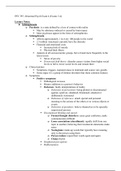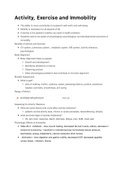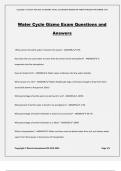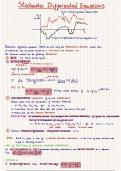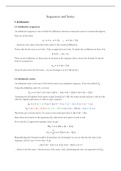PSY 395: Abnormal Psych Exam 4 (Exams 3-4)
Lecture Notes:
Schizophrenia oPsychosis: is a state defined by a loss of contact with reality
May be substance induced or caused by brain injury
Most psychoses appear in the form of schizophrenia
oSchizophrenia
Affects approximately 1 in every 100 people in the world
2.5 million Americans currently have the disorder
Financial and emotional costs
Increased risk of suicide
Physical/fatal illness
Appears in all socioeconomic groups, but is found more frequently in the lower levels
Stress of poverty
Downward drift theory : disorder causes victims from higher social levels to fall to lower social levels and remain there
oClinical picture
Symptoms, triggers, responsiveness to treatment and course vary greatly
Some argue it is a group of distinct disorders that share common features
oSymptoms
Positive symptoms
Pathological excesses
Bizarre additions to a person’s behavior
Delusions: faulty interpretations of reality
oDelusions of persecution: being plotted or discriminated against, spied on, slandered, threatened, attacked or deliberately victimized
oDelusions of reference: attach special and personal meaning to the actions of the others or to various objects or events
oDelusions of grandeur: believe themselves to be specially empowered persons
Disorganized thinking and speech
oFormal thought disorders: cause great confusion, make communication difficult
oLoose associations (derailment): rapidly shift from one topic to another, believing their incoherent statements make
sense
oNeologisms: made-up words that typically have meaning only to the person using them
oPerseveration: repeat their words again and again
oClang: rhyme Heightened perceptions
Hallucinations oAuditory- most common
High blood flow to broca’s area
oTactile
oSomatic
oVisual
oGustatory
oOlfactory
Inappropriate affect : display emotions that are unsuited to the situation
Negative symptoms
“pathological deficits”
Characteristics that are lacking in an individual
Poverty of speech (alogia): reduction in speech or speech content
Restricted affect
oBlunted affect: show less feelings than most people
oFlat effect: show almost no emotion at all
oAnhedonia: general lack of pleasure or enjoyment
Loss of volition (motivation or directedness)
oAvolition (apathy): feeling drained of energy and of interest in normal goals and unable to start or follow through on a course of action
oFeel ambivalence about most things
Social withdrawal
oWithdraw from their social environment and attend only to their own ideas and fantasies
oBreakdown of social skills
Psychomotor symptoms
Occurs occasionally in patients
May take extreme forms, cataonia
Slow movements
Catatonic posturing : awkward poses for a long period
Repeated grimaces
Odd gestures
Catatonic rigidity: maintain a rigid upright posture for hours
Catatonic stupor: stop responding to their environment
Catatonic excitement: move excitedly
oCourse of schizophrenia:
Usually appears between the late teens and mid-30s
Three phases:
Prodromal: symptoms are not yet obvious
Active: symptoms become apparent
oSometimes triggered by stressful event
Residual: return to a prodromal-like level of functioning
Each phase of the disorder may last for days or years
A fuller recovery from the disorder is more likely in people: With good premorbid functioning
Whose disorder was triggered by stress
With abrupt onset
With later onset (during middle age)
Who receive early treatment
Distinction between type I and type II schizophrenia helps predict the course of the disorder
Type I: dominate by positive symptoms
oMore likely to show improvement, especially when treated with medications oTied to biochemical abnormalities
Type II: dominated by negative symptoms
oTied to structural abnormalities in the brain
oCauses:
Diathesis-stress relationship: people with biological predisposition will develop schizophrenia only if certain kinds of stressors or events are also present
Biological views have gained most support
Genetic factors:
Diathesis-stress perspective: oSome people inherit a biological predisposition to schizophrenia
Disposition and disorder are triggered by later exposure to stress
Supported by studies of relatives, twins, and adoptees and by genetic linkage studies and molecular biology
Family pedigree studies have repeatedly found schizophrenia is more common among relatives of people with the disorder
oThe more closely related they are, the greater their likelihood is to have the disorder
oFactors other than genetics could explain these factors
Twin studies
oIdentical twins: if one twin develops the disorder, 48% chance the other twin will too
oFraternal twins: 17% chance of the other twin developing the disorder
oFactors other than genetics could explain
Adoption studies
oBiological relatives of adoptees with schizophrenia are more likely to display schizophrenia symptoms than than are their adoptive relatives
Genetic linkage and molecular biology studies indicate that possible gene defects on numerous chromosomes may predispose individuals to develop schizophrenia
oVaried findings indicate: “Mistaken identity”: that is, some of these gene sites do not contribute to the disorder
different types of schizophrenia are linked to different genes
schizophrenia, like many disorders, is a polygenic disorder, caused by a combination of gene defects
May lead to development through two kinds of (potentially inherited) biological abnormalities:
oBiochemical abnormalities
oAbnormal brain structure
Biochemical abnormalities
Dopamine hypothesis: certain neurons using dopamine fire too often, producing symptoms of schizophrenia
Theory is based on the effectiveness of antipsychotic medications
oCaused Parkinson’s disease-like tremor response in patients
oRelationship between symptoms suggested that they were related to excess dopamine
Have located the dopamine receptors where antipsychotic drugs bind
oCertain dopamine receptors are known to play a key role in guiding attention
Dopamine may be overactive in people with schizophrenia because
of a larger-than-usual number of dopamine receptors or their dopamine receptors may operate abnormally
Antipsychotic drugs: help correct grossly confused or distorted thinking
Phenothiazines: group of antihistamine drugs that became the first
group of effective antipsychotic medications
Second generation antipsychotic drugs: more effective than the traditional ones
oBind to serotonin receptors
oAbnormal activity or interactions of both dopamine and serotonin
Abnormal brain structure
Lecture Notes:
Schizophrenia oPsychosis: is a state defined by a loss of contact with reality
May be substance induced or caused by brain injury
Most psychoses appear in the form of schizophrenia
oSchizophrenia
Affects approximately 1 in every 100 people in the world
2.5 million Americans currently have the disorder
Financial and emotional costs
Increased risk of suicide
Physical/fatal illness
Appears in all socioeconomic groups, but is found more frequently in the lower levels
Stress of poverty
Downward drift theory : disorder causes victims from higher social levels to fall to lower social levels and remain there
oClinical picture
Symptoms, triggers, responsiveness to treatment and course vary greatly
Some argue it is a group of distinct disorders that share common features
oSymptoms
Positive symptoms
Pathological excesses
Bizarre additions to a person’s behavior
Delusions: faulty interpretations of reality
oDelusions of persecution: being plotted or discriminated against, spied on, slandered, threatened, attacked or deliberately victimized
oDelusions of reference: attach special and personal meaning to the actions of the others or to various objects or events
oDelusions of grandeur: believe themselves to be specially empowered persons
Disorganized thinking and speech
oFormal thought disorders: cause great confusion, make communication difficult
oLoose associations (derailment): rapidly shift from one topic to another, believing their incoherent statements make
sense
oNeologisms: made-up words that typically have meaning only to the person using them
oPerseveration: repeat their words again and again
oClang: rhyme Heightened perceptions
Hallucinations oAuditory- most common
High blood flow to broca’s area
oTactile
oSomatic
oVisual
oGustatory
oOlfactory
Inappropriate affect : display emotions that are unsuited to the situation
Negative symptoms
“pathological deficits”
Characteristics that are lacking in an individual
Poverty of speech (alogia): reduction in speech or speech content
Restricted affect
oBlunted affect: show less feelings than most people
oFlat effect: show almost no emotion at all
oAnhedonia: general lack of pleasure or enjoyment
Loss of volition (motivation or directedness)
oAvolition (apathy): feeling drained of energy and of interest in normal goals and unable to start or follow through on a course of action
oFeel ambivalence about most things
Social withdrawal
oWithdraw from their social environment and attend only to their own ideas and fantasies
oBreakdown of social skills
Psychomotor symptoms
Occurs occasionally in patients
May take extreme forms, cataonia
Slow movements
Catatonic posturing : awkward poses for a long period
Repeated grimaces
Odd gestures
Catatonic rigidity: maintain a rigid upright posture for hours
Catatonic stupor: stop responding to their environment
Catatonic excitement: move excitedly
oCourse of schizophrenia:
Usually appears between the late teens and mid-30s
Three phases:
Prodromal: symptoms are not yet obvious
Active: symptoms become apparent
oSometimes triggered by stressful event
Residual: return to a prodromal-like level of functioning
Each phase of the disorder may last for days or years
A fuller recovery from the disorder is more likely in people: With good premorbid functioning
Whose disorder was triggered by stress
With abrupt onset
With later onset (during middle age)
Who receive early treatment
Distinction between type I and type II schizophrenia helps predict the course of the disorder
Type I: dominate by positive symptoms
oMore likely to show improvement, especially when treated with medications oTied to biochemical abnormalities
Type II: dominated by negative symptoms
oTied to structural abnormalities in the brain
oCauses:
Diathesis-stress relationship: people with biological predisposition will develop schizophrenia only if certain kinds of stressors or events are also present
Biological views have gained most support
Genetic factors:
Diathesis-stress perspective: oSome people inherit a biological predisposition to schizophrenia
Disposition and disorder are triggered by later exposure to stress
Supported by studies of relatives, twins, and adoptees and by genetic linkage studies and molecular biology
Family pedigree studies have repeatedly found schizophrenia is more common among relatives of people with the disorder
oThe more closely related they are, the greater their likelihood is to have the disorder
oFactors other than genetics could explain these factors
Twin studies
oIdentical twins: if one twin develops the disorder, 48% chance the other twin will too
oFraternal twins: 17% chance of the other twin developing the disorder
oFactors other than genetics could explain
Adoption studies
oBiological relatives of adoptees with schizophrenia are more likely to display schizophrenia symptoms than than are their adoptive relatives
Genetic linkage and molecular biology studies indicate that possible gene defects on numerous chromosomes may predispose individuals to develop schizophrenia
oVaried findings indicate: “Mistaken identity”: that is, some of these gene sites do not contribute to the disorder
different types of schizophrenia are linked to different genes
schizophrenia, like many disorders, is a polygenic disorder, caused by a combination of gene defects
May lead to development through two kinds of (potentially inherited) biological abnormalities:
oBiochemical abnormalities
oAbnormal brain structure
Biochemical abnormalities
Dopamine hypothesis: certain neurons using dopamine fire too often, producing symptoms of schizophrenia
Theory is based on the effectiveness of antipsychotic medications
oCaused Parkinson’s disease-like tremor response in patients
oRelationship between symptoms suggested that they were related to excess dopamine
Have located the dopamine receptors where antipsychotic drugs bind
oCertain dopamine receptors are known to play a key role in guiding attention
Dopamine may be overactive in people with schizophrenia because
of a larger-than-usual number of dopamine receptors or their dopamine receptors may operate abnormally
Antipsychotic drugs: help correct grossly confused or distorted thinking
Phenothiazines: group of antihistamine drugs that became the first
group of effective antipsychotic medications
Second generation antipsychotic drugs: more effective than the traditional ones
oBind to serotonin receptors
oAbnormal activity or interactions of both dopamine and serotonin
Abnormal brain structure

